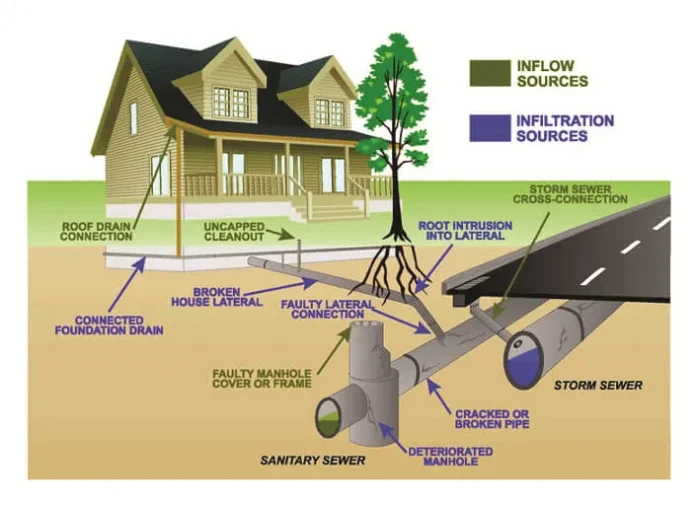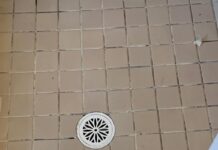A sewer line clog can be a homeowner’s worst nightmare, resulting in inconvenient plumbing issues and even costly repairs.
Understanding the common causes and how to deal with a main sewer line clog is essential to keeping your home running smoothly and avoiding potential disasters.
Today’s informative article will explore the reasons behind sewer line blockages, how to identify warning signs of a problem, and various methods used by professionals to resolve such issues.
If you’re currently dealing with a clogged sewer line, you should contact an experienced plumbing service, like the team at Clover Services.
Common Causes Of Main Sewer Line Clogs
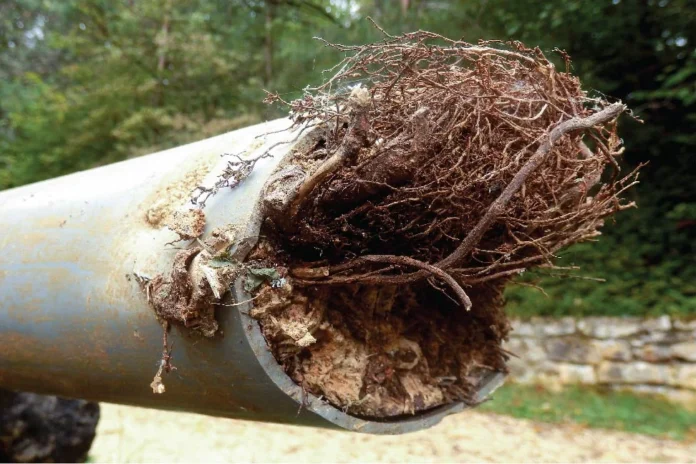
Sewer line clogs can be caused by various factors, including grease, fats, and oil buildup; tree roots penetrating pipes; and aging, cracked, or broken pipes.
Grease, Fats, And Oil Buildup
One of the leading causes of main sewer line clogs is the accumulation of grease, fats, and oil in your pipes. These substances tend to stick to the inner walls of your plumbing system over time, causing a thick buildup that can eventually obstruct water flow.
To prevent this type of clogging issue in your home’s main sewer line, always be mindful of what you dispose of down your sink drains. Instead of pouring greasy substances directly into your plumbing system, collect them in a container and throw them away with regular trash once they have solidified.
Additionally, using a mesh sink strainer can help catch larger food particles before they make their way into your pipes.
Regular maintenance of your main sewer line is crucial to avoid costly repairs. Another effective preventive measure is to schedule periodic professional drain cleaning services. A qualified plumber can utilize specialized tools and techniques to remove any accumulated grease, fats, and oil from your pipes, ensuring smooth water flow.
Educating your household members about proper disposal practices is essential. Encourage everyone to scrape excess food into the trash before rinsing dishes and utensils. Avoid flushing non-biodegradable items, such as wipes or sanitary products, down the toilet, as they can contribute to clogs.
Furthermore, consider using enzyme-based drain cleaners on a monthly basis. These products contain natural bacteria that break down organic matter, including grease and oil, helping to prevent buildup in your plumbing system.
Remember, taking proactive steps to prevent main sewer line clogs can save you from inconvenient backups and expensive repairs in the long run.
Tree Roots Penetrating Pipes
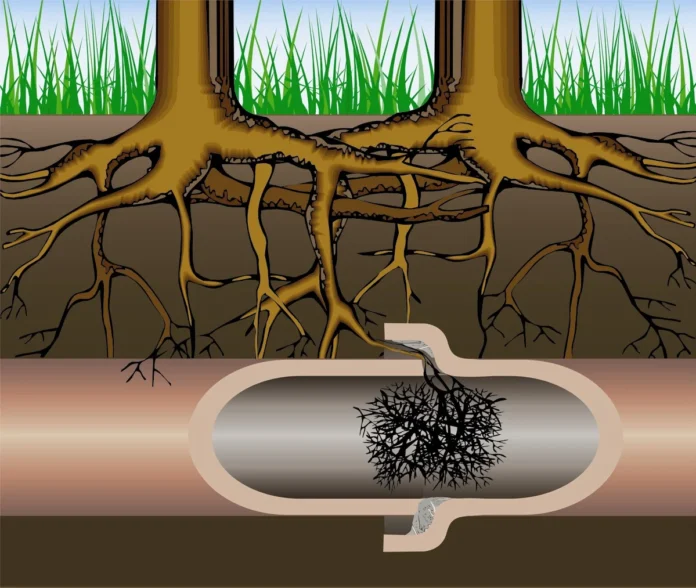
Another common cause of main sewer line clogs is tree roots penetrating pipes. As trees grow, their roots can extend deep into the ground in search of water and nutrients.
Unfortunately, this can also mean that they come into contact with your home’s sewer lines.
Homeowners with large trees growing near their homes should know about this potential problem. Signs that roots may be causing a clog include:
- Slow-draining sinks or toilets.
- Gurgling sounds are coming from the drains.
- Foul odors emanating from plumbing fixtures.
If you suspect that tree roots are blocking your main sewer line, it’s essential to call a professional plumber immediately before the damage gets worse. They may suggest hydro jetting or replacing portions of the sewer pipe altogether to solve the issue permanently.
Aging, Cracked, Or Broken Pipes
One of the most common causes of a main sewer line clog is aging, cracked, or broken pipes. As pipes age and become brittle, they are more prone to breaking under pressure.
This can be caused by shifting soil, changes in temperature, or even invasive plant species such as tree roots penetrating the pipes.
Signs of aging pipelines may include low water pressure or discolored tap water due to rust flakes being washed out from corroded iron pipes. You may notice problems such as sewage backups and overflows near your sinks or toilets if you have aging plumbing since waste particles accumulate inside old and rusty piping over time.
How To Unclog A Main Sewer Line — 2 Tried-and-True Techniques
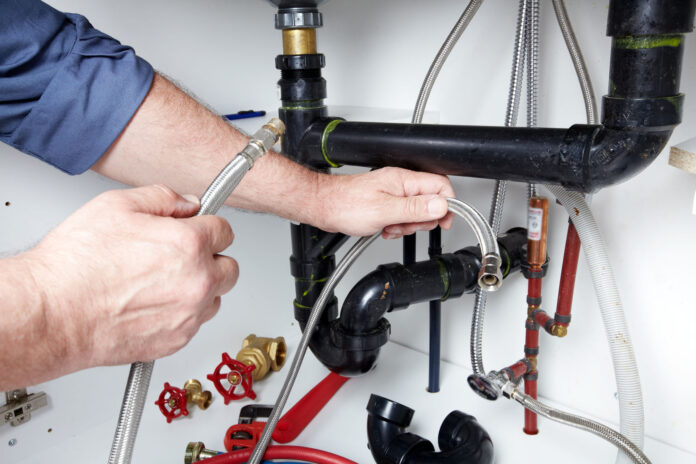
To fix a main sewer line clog, homeowners can opt for professional drain cleaning services that use specialized equipment like hydro jetting to remove stubborn clogs or even repair or replace damaged pipes.
Professional Drain Cleaning
Professional drain cleaning is an effective and efficient way to clear a main sewer line clog. Plumbers have specialized equipment and tools to remove blockages quickly, effectively, and safely.
Plumbers typically use hydro jetting as the primary method for clearing out sewer line blockages during professional drain cleaning. Hydro jetting uses high-pressure water to blast away debris inside pipes without causing any damage.
An experienced plumber should always do professional drain cleaning to ensure that it’s done correctly without causing further damage or making the problem worse.
Homeowners should consider scheduling regular preventive maintenance services with their plumber to avoid future issues with their sewer lines.
Hydro Jetting
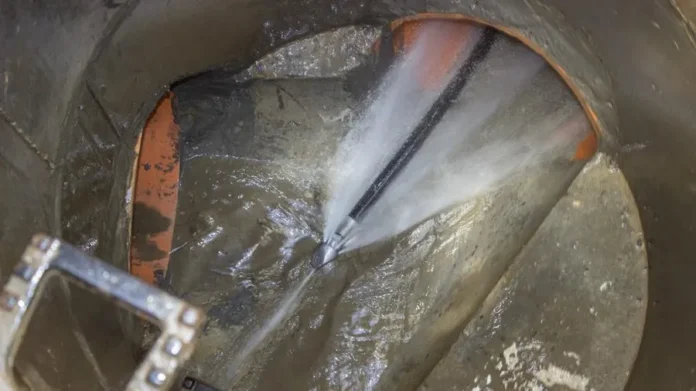
Hydro jetting is a powerful and effective method of clearing main sewer line clogs. This technique utilizes high-pressure water streams to blast away blockages, debris, and buildup inside the pipes.
By using this process, homeowners can effectively remove stubborn blockages caused by grease, oil, tree roots or other foreign objects that have lodged in their plumbing system.
Unlike traditional methods that rely on chemicals or mechanical devices like snakes to break up blockages in your sewer line, hydro jetting offers a more efficient solution without damaging your pipes.
How to Unclog Main Sewer Lines — Conclusion
In conclusion, a main sewer line clog can bring your household to a standstill. Fortunately, there are effective ways of tackling this plumbing emergency. As we have seen, tree roots penetrating pipes, aging or broken pipes, and grease buildup are common causes of these blockages.
A professional drain cleaning service or hydro jetting can help unclog your system. Homeowners should remain vigilant for signs like slow-draining sinks or foul odors to avoid costly repairs and regularly maintain their sewer lines.

